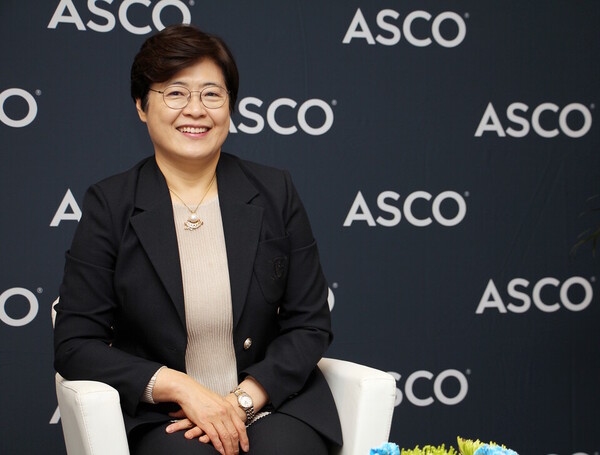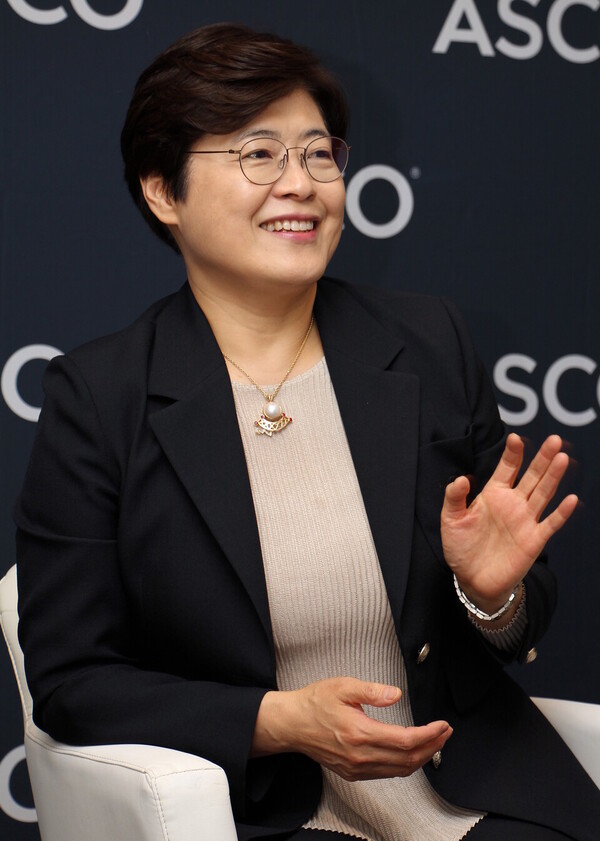“The Korean Cancer Association (KCA) will no longer be a research-focused group. We will strengthen our role as a hub connecting policy, clinical practice, and the public.”
KCA President Rha Sun-young, who also serves as a professor of oncology at Yonsei Cancer Center, recently met with Korea Biomedical Review to explain the achievements of the past year and plans for the remaining year of her term.

Helping to resolve pending issues, such as reimbursement for anticancer combo therapy and companion diagnosis fee system
Over the past year, the association has connected the medical, government, and industrial communities to achieve paradigm-shifting policy outcomes for cancer care. One of the most notable achievements was resolving the reimbursement issue for chemotherapy combinations, which had been stalled for over a decade.
After working closely with patient organizations and making continuous suggestions and discussions, the revision of the Ministry of Health and Welfare's administrative notice was finally achieved in May,” Rha noted. “That marked a turning point in the cancer cure reimbursement system.”
Previously, if a new combination drug were added to an already reimbursed cancer drug, the existing drug would be deprived of benefits. With this revision, patients can avoid unnecessary financial burdens, as their existing drugs will remain covered.
In addition, the KCA's efforts have resulted in a significant change to the companion diagnostic fee system.
Previously, when a new biomarker was included in an immunohistochemical test (IHC), the National Evidence-based Healthcare Coordinating Agency (NECA) had to evaluate it as a new medical technology to receive reimbursement. Still, receiving “Level 1” companion diagnostic reimbursement has become possible without NECA evaluation. If the biomarker-based therapy is reimbursed, it will automatically be converted to the “companion diagnostic fee” (Level 2).
“This change will be a decisive step forward for the Korean precision medicine ecosystem, as it will allow doctors, hospitals, and industry to continue to innovate within a predictable system.”
Revitalizing allied activities centered on 'Council of Cancer-related Societies'
In 2016, the KCA proposed the establishment of the “Council of Cancer-Related Societies,” citing the need for an expert organization that could respond quickly and credibly to cancer-related issues. The council, which was officially launched in 2017 after a delegate meeting and working committee discussions, is a voluntary collaboration of cancer-related societies in various fields, including cancer care, research, education, and policy.
Currently, 26 societies participate in the council, including the KCA, the Korean Society of Medical Oncology, the Korean Society of Surgical Oncology, the Korean Society of Nuclear Medicine, the Korean Society of Hematology, and the Korean Society of Hospice and Palliative Care.
Such a cancer-centered, not specialty-centered, council is regarded as a representative model of multidisciplinary collaboration that encompasses the entire lifecycle of diagnosis, surgery, anticancer treatment, radiation, rehabilitation, and palliative care based on each society's unique expertise.
The KCA has developed practical solidarity activities, including joint statements, policy proposals, and co-organizing academic events. It plans to increase its social voice further. “Recognizing that cancer care is not the sole province of a single specialty, the council that brings together diverse professional groups will become increasingly important in the future,” Rha said.
The KCA has engaged in practical alliance activities, such as joint statements, policy proposals, and co-sponsorship of academic events, by bringing together the expertise of each society. “At this year's Asia Oncology Summit (AOS), more than 10 societies participated as a vice chair group to create academic synergy,” Rha said, emphasizing that “it is time to increase our social voice.”
As an extension of this, the KCA has also voiced its concerns about recent issues, including tobacco control policies and legal actions against tobacco companies.
"The Korean Association for Lung Cancer led it, but we brought together the relevant councils to make a joint statement. We realized that we have much more impact together than alone and want to expand this solidarity work," the KCA head said.
Strengthening collaboration with National Cancer Center by co-promoting big data-policy nexus
The KCA also promotes collaborations with the National Cancer Center (NCC). The fact that the NCC Director Yang Han-kwang is a former KCA president has strengthened the link.
The most representative project is producing public information content with the National Cancer Information Center within the NCC. The content will be produced in various formats, such as videos, printed materials, and social media content, through consultation with trusted experts on matters the public must know, including cancer prevention, early diagnosis, and access to treatment.
The core of the collaboration is to plan and provide content that the public can trust based on the vast cancer-related statistics, policy data, and population analysis information held by the National Cancer Information Center and a multidisciplinary council led by the KCA.
“Our goal is to go beyond just providing information to provide a holistic understanding of the entire cancer treatment cycle and reduce unnecessary anxiety and misunderstanding,” Rha said.
"The National Cancer Information Center is a public institution that has accumulated objective and reliable data, and the KCA is an academic organization that can bring together the voices of each specialty. By working together, we expect to dramatically improve the quality and accuracy of cancer information available to the public," the KCA president said.
Based on the screening and mortality statistics data held by the National Cancer Center, the KCA will also conduct a detailed analysis of cancer survival rate trends over the past 20 years to demonstrate the excellence of cancer treatment in Korea.
"There is already statistical evidence that survival rates for major cancers, such as stomach, colon, and breast cancer, are better than in other countries. It is the role of society to communicate this scientific data to the public and policymakers clearly," Rha emphasized.
Reading cancer research trends by tying up with National Academy of Medicine of Korea
The KCA has recently launched a project in partnership with the National Academy of Medicine of Korea to analyze the changes in cancer research in Korea over the past 20 years.
"Beyond simple statistics, we want to show what topics have been researched in cancer over the past 20 years and how the trends have changed through bibliographic analysis. For example, while developing anticancer drugs was mainstream in the past, there has been a recent trend toward AI-based diagnostic technologies, biomarkers, and real-world data (RWD) research," Rha explained.
The results will be included in next year's “Korean Medical Research Trends Report,” published by the National Academy of Medicine of Korea, to be shared with the government and medical institutions.
The cancer field was chosen as the first subject of analysis for this project because it has a high rate of change and innovative research. If the results of this analysis are positively received, the bibliometric analysis project will be expanded to other major diseases, such as diabetes and heart disease, in the future.

KCA will expand partnerships, seeking strength in ‘going together’
"The Korean Cancer Society is evolving from a bridge between research, clinical, and policy to a hub that connects the public," Rha stressed.
“Nothing can be done alone. We will continue collaborating with the National Cancer Center, the National Academy of Medicine of Korea, the Council of Cancer-related Societies, and the industry," Rha said. “For cancer treatment and policy to move in a better direction, we need credible ‘information’ and ‘opinions’ that can persuade the public and policymakers, not just discussions within the medical community. The KCA will play that role," Rha said.
KCA President Rha's initiative goes beyond mere academic activities, leading to a larger vision of restoring publicity to the cancer field and building a people-centered cancer management system.
Related articles
- [ASCO 2025] ‘LEAP-015 trial failed, but it left valuable lesson’
- Vyloy launch in Korea nears but reimbursement hurdles restrict patient access
- ‘FGFR2b’ draws interest as a new biomarker for gastric cancer treatment
- Bill seeks to include dementia, renal failure, and heart failure patients in the hospice program

